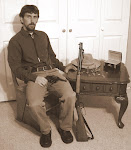I had a great time reading a historical novel by a Lakota - Hundred in the Hand tells the story of the Fetterman Massacre from the perspective of the native American.
A lot of controversy surrounds the events of the Fetterman Massacre - perhaps the most argued issue is whether or not Crazy Horse was present. To the Lakota, there is no question. This was the place where he truly became a great symbol in the eyes of his people.
I read another book by Marshall a year ago - it was a biography entitled
The Journey of Crazy Horse. I truly enjoyed the effort it took to see things from a different perspective than the one we get in our typical history books. History is always written by the winners...and so it is possibly not very objective.
Although God clearly had a hand in the westward expansion in America, a lot of really ugly human characteristics were made manifest in the treatment of the native Americans. There was a lot of greed and ambition, and there was sometimes a thirst for blood, especially among former fighters in the Civil War. It is also difficult to understand the historical bigotry and racism that existed amongst many who came west. I am describing a general problem associated with the human condition throughout the history of the world - a lack of respect for differences and a closed mind when faced with diversity.
I do understand that many migrants experienced hardship and suffering at the hands of native Americans, but it is important to consider the many reasons why the natives responded to the westward expansion the way that they did. It is also important to understand that they experienced many broken promises from the white people along the way and therefore lost trust in them.
I am not so much of a pragmatist to think that growth and efficiency must always be best, and I am not so much of a Darwinist to think that it was simply good for the stronger people to prevail. I appreciate Mr. Marshall's writing, and I recommend it to others...enjoy!
 Goodness gracious, life comes at you very fast. My second Prince, who is nine years old, has just survived a great battle.
Goodness gracious, life comes at you very fast. My second Prince, who is nine years old, has just survived a great battle.






